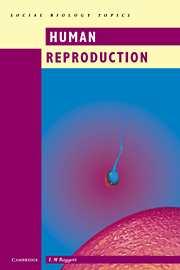Book contents
- Frontmatter
- Contents
- 1 Human reproductive strategies
- 2 Gamete production
- 3 Fertilisation
- 4 Implantation and pregnancy
- 5 Birth and lactation
- 6 Contraception
- 7 Human infertility: background and causes
- 8 Human subfertility: options and treatment
- 9 Ethical and moral considerations of fertility and infertility
- Index
2 - Gamete production
Published online by Cambridge University Press: 05 June 2012
- Frontmatter
- Contents
- 1 Human reproductive strategies
- 2 Gamete production
- 3 Fertilisation
- 4 Implantation and pregnancy
- 5 Birth and lactation
- 6 Contraception
- 7 Human infertility: background and causes
- 8 Human subfertility: options and treatment
- 9 Ethical and moral considerations of fertility and infertility
- Index
Summary
Omnis cellula e cellula, ‘All cells from cells’ stated the German clinician Rudolf Virchow in 1855. From the beginning of evolution, the cells constituting the bodies of all life on Earth have come from pre-existing cells. More than any other characteristic of life, the ability to reproduce distinguishes the living from the non-living, and the process of reproduction is based on the cell cycle, the turn of which is dependent on cell division.
Cell cycle
Along with all other living things, except bacteria and cyanobacteria, the bodies of human beings are made up of eukaryotic cells. The vast majority of these cells are continually renewed and replaced by a form of cell division. This complex but ordered process involves duplication of the genetic material (DNA) in the nucleus of the cell, followed by its division into two equal portions, the migration of the portions to opposite sides of the cell (this part of the process is called mitosis), and finally the division and partition of the cytoplasm and its contents (cytokinesis).
A full cell cycle is that period from the end of one mitosis to the beginning of the next (figure 2.1). Division is the shortest phase of the cell cycle, and represents 5–10% of the total cell cycle time. Known as the M (or mitotic) phase, it is separated from the next M phase in the cycle by interphase, in which the cell is metabolically active and performs whatever functions for which it is adapted.
- Type
- Chapter
- Information
- Human Reproduction , pp. 10 - 21Publisher: Cambridge University PressPrint publication year: 1997



